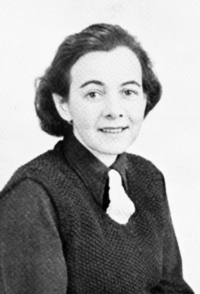Karin Boye
| Karin Boye | |
|---|---|

Karin Boye in the 1940s
|
|
| Native name | Karin Maria Boye |
| Born |
October 26, 1900 Gothenburg |
| Died | 21 April 1941 (aged 40) Alingsås |
| Resting place | Östra kyrkogården, Gothenburg |
| Nationality | Swedish |
| Genres | novel, poetry, essay |
| Notable works | "Yes, of course it hurts", Kallocain |
| Years active | 1922-1941 |
| Spouse | Leif Björk (1929–1932) |
| Partner | Margot Hanel (1934–1941) |
Karin Maria Boye (![]() listen ; 26 October 1900 – 24 April 1941) was a Swedish poet and novelist.
listen ; 26 October 1900 – 24 April 1941) was a Swedish poet and novelist.
Boye was born in Gothenburg (Göteborg), Sweden and moved with her family to in 1909. In Stockholm, she studied at the Åhlinska skolan until 1920. She studied at Uppsala University from 1921 to 1926 and debuted in 1922 with a collection of poems, "Clouds" (Swedish: Moln). During her time in Uppsala and until 1930, Boye was a member of the Swedish Clarté League, a socialist group in those days very anti-Fascist.
In 1931 Boye, together with Erik Mesterton and Josef Riwkin, founded the poetry magazine Spektrum, introducing T. S. Eliot and the Surrealists to Swedish readers. She translated many of Eliot's works into Swedish; she and Mesterton translated "The Waste Land".
Boye is perhaps most famous for her poems, of which the most well-known ought to be "Yes, of course it hurts" (Swedish: Ja visst gör det ont) and "In motion" (I rörelse) from her collections of poems "The Hearths" (Härdarna), 1927, and "For the sake of the tree" (För trädets skull), 1935. She was also a member of the Swedish literary institution Samfundet De Nio (The Nine Society) from 1931 until her death in 1941.
Boye's novel "Crisis" (Kris) depicts her religious crisis and lesbianism. In her novels "Merit awakens" (Merit vaknar) and "Too little" (För lite) she explores male and female role-playing.
...
Wikipedia
